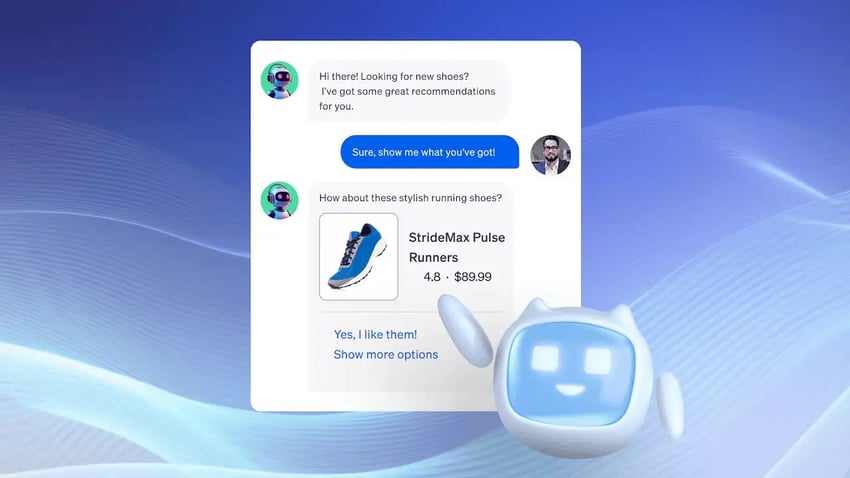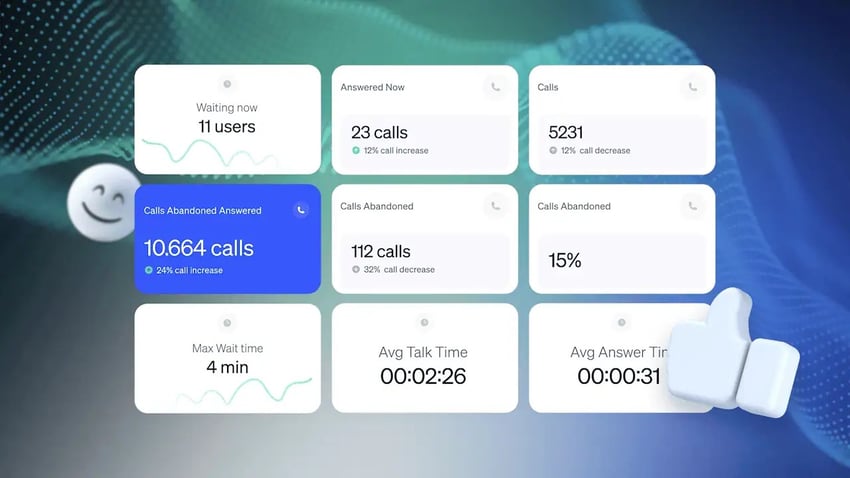As your business grows, answering every call becomes a challenge. But missing a call can mean losing a customer. A single receptionist can be overwhelmed during peak times, and in today’s market, customers expect instant responses.
Studies show that more than half of customers contact a service provider shortly after completing their online search. Yet 42% of small businesses admit to struggling with call management and suffering revenue losses from unanswered calls.
If you’re missing calls due to staffing shortages or high call volume, consider an AI receptionist. AI answering services are increasingly popular solutions for small businesses, offering improved customer service efficiency, greater availability, and cost-effectiveness. One major AI answering service benefit is the ability to save costs, maintain high availability, and support business growth by efficiently handling high call volumes.
Here, we examine what AI-powered virtual assistants are, the key benefits they offer, and what to consider when selecting one. You’ll also get a balanced comparison of the top providers to help you find the most cost-effective, reliable, and best AI receptionist for your business.
Missing calls can cost you thousands.
Unanswered calls add up fast. Our free calculator reveals the revenue impact of every missed opportunity.
What Is an AI Receptionist?
An AI receptionist is a voice-based assistant that uses natural language processing (NLP) to comprehend and respond to calls in a conversational manner. Think of it as conversational AI that handles business calls without human input. This technology is also known as an AI phone receptionist, providing a comprehensive, 24/7 virtual service that manages calls, captures missed calls, schedules appointments, and helps convert calls into bookings or revenue.
The AI receptionist is a complementary feature of business phone systems that sync with CRMs, emails, calendars, and other business tools. These solutions are powered by virtual receptionist software that automates front-desk tasks such as answering calls, scheduling appointments, and handling customer inquiries, seamlessly across businesses of all sizes and industries.
This technology can lower long-term costs because you don’t have to pay them a salary. AI receptionists significantly reduce operational costs compared to hiring human staff. When set up strategically, AI receptionists deliver consistent performance, from data collection to adherence to predefined workflows. When properly implemented, AI receptionist solutions cost less than a human receptionist, and you can estimate the cost using the AI receptionist cost calculator.

The Benefits of Using an AI Receptionist
You get many benefits from using AI-powered receptionists. Let’s look at a few key ones:
1. 24/7 availability and lead capture
Most businesses miss calls after 5 PM, on weekends, or when the lines are busy. Those calls often go straight to a competitor. A virtual phone receptionist covers your incoming calls after hours. It answers late-night calls, handles overflow during peak times, and qualifies new leads right away.
AI receptionists can handle multiple calls simultaneously, ensuring no customer inquiries are missed, even during busy periods. Instead of sending callers to voicemail, it ensures every caller gets a response. Your phone shifts from being a daytime tool to a 24/7 business channel.
2. Increased team productivity
Your staff shouldn’t spend their day answering the same basic questions or booking appointments. AI receptionists excel at managing calls, allowing your team to focus on higher-value tasks. An AI receptionist handles scheduling, answers FAQs, and automatically syncs with your CRM.
Net-net, this gives your team space to focus on work that drives growth, closes sales, supports clients, and handles tasks that require a human touch.
3. Enhanced customer experience
High hold times and rigid call flows turn people away. AI-powered answering systems let callers speak in their own words and get help. AI receptionists can engage in human-like conversations, making interactions feel natural and friendly.
You can set voice styles, offer SMS options, and ensure every caller has a professional, smooth experience. It removes friction, saves time, and leaves a strong first impression on new prospects.
4. Data-driven business insights
Many business owners make decisions based on gut instinct or scattered notes. An AI receptionist shows you real data: why people call, peak call times, and how conversations flow. Real-time reports make it easier to plan staffing, adjust marketing, and improve service.
From built-in call recording to instantly dispatched call summaries, you can review and analyze for deeper insights. They can automatically log and organize call transcripts in a centralized dashboard for easy review. Built-in security and compliance features also keep customer data safe while giving you the right insights.
How AI Receptionists Work
AI receptionist solutions work by being accessible from a dedicated phone number or phone extension. When new calls arrive, your phone system routes calls to the AI phone agent. From there, it establishes context about the caller and adheres to business rules when callers speak their requests and interact with the AI receptionist.
The dialogue and interaction itself are handled discreetly and instantly with powerful APIs from enterprise-grade voice AI models, app integrations, and IP telephony.
AI virtual receptionists use Natural Language Processing (NLP) to understand spoken language and hold real-time conversations with callers. When someone calls, the AI converts human speech into text, interprets the meaning, and decides what action to take. AI receptionists handle incoming calls and can also manage texts and chats using advanced machine learning and NLP.

Modern AI receptionists like XBert AI use high-speed NLP to maintain a fluid conversational flow with customers. Here’s how the process works in practice:
AI training and setup
To set up your AI receptionist, you input key company information into a knowledge base or central library from which the AI will draw its answers. These include data such as business hours, team bios, and FAQs. The AI can also auto-import information from your company website or CRM.
Uploading these useful details enables the AI to provide relevant, accurate answers to specific queries every time, even when the wording varies.
Nextiva handles the entire AI answering service setup and implementation. No coding. Get XBert now
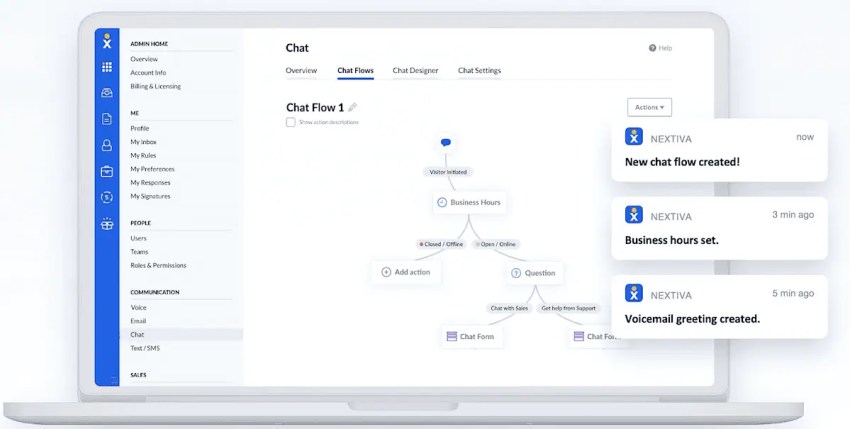
Answering and routing
AI receptionists don’t put callers on hold but start engaging immediately, using voice recognition and smart logic to identify the caller’s intent. They provide accurate responses, ensuring callers receive the right information quickly.
They then act accordingly, whether to solve an issue, connect the caller to the right person, or set a call-back in motion.
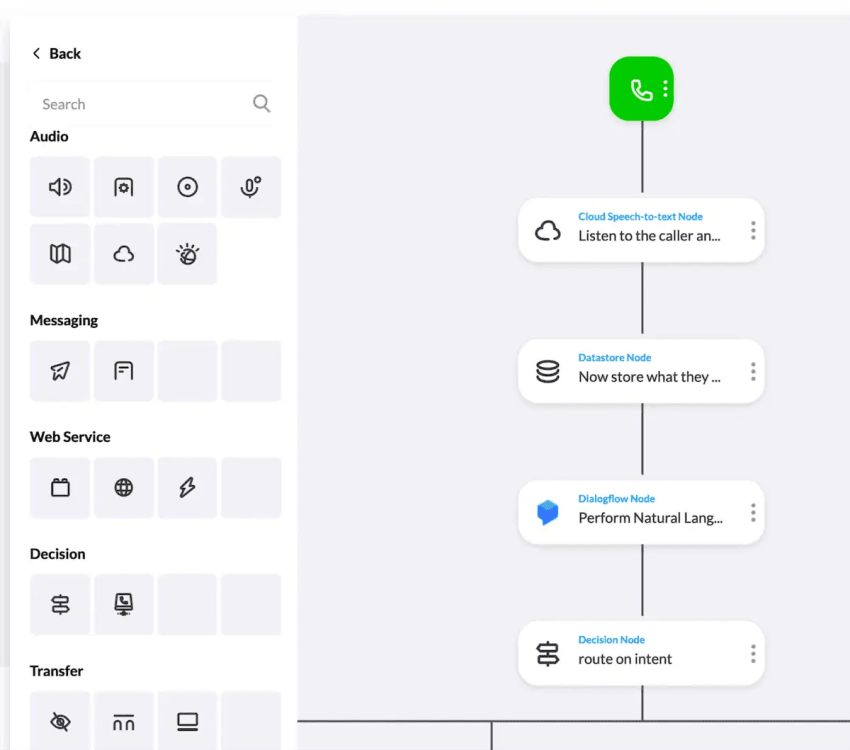
Appointment management and SMS
With calendar integration, AI receptionists can book appointments on the spot and schedule appointments seamlessly for callers, sending automated text message confirmations and reminders to reduce no-shows.
As a result, you can spare your staff the time-consuming task of manually chasing down clients or sending emails to update them. Besides having fewer missed meetings, you can clear your schedule for new clients in place of cancellations.

After-hours and high call volumes
AI receptionists go on duty when phone calls surge or your front desk team clocks out. They capture inbound calls that would have gone to voicemail and ensure follow-up happens.
Additionally, their cloud-based infrastructure enables easy scaling, as they can absorb overflow during peak hours by routing calls based on your predefined rules. This automated distribution keeps your lines free and prevents long wait times that frustrate callers.
To see these AI capabilities in action, the video below provides a great visual overview of how AI is transforming modern business phone systems.

Top 3 AI Receptionist Providers in 2026
Let’s explore these top three AI receptionist solutions, their features, and best use cases to help you choose the optimal answering service for your business.
| Key features | Nextiva XBert AI | Dialpad | RingCentral (RingEX) |
|---|---|---|---|
| Natural language interactions | Understands caller intent through the IVR call management process and clear routing paths | Handles open-ended speech with sentiment detection and voice recognition | Supports varied caller phrasing with smart routing and multilingual options |
| CRM integration | Syncs with customer data for contextual call handling | Links to call notes, contact history, and sales workflows | Connects to CRM tools for routing and contact resolution |
| SMS capabilities | Sends appointment confirmations and reminders via integrated texting | Delivers text messages tied to meeting follow-ups and sends missed call alerts through API | Provides SMS alerts for appointments, routing status, and spam filtering |
| Appointment booking | Books and updates appointments through connected calendar tools | Schedules meetings and suggests follow-ups post-call | Coordinates scheduling and sends alerts through linked apps |
| Voice customization | Offers preset call greetings with branded messaging options | Allows voice tone adjustments and learning-based improvements | Supports customizable voice personas with tone, pace, and language preferences |
| Workflow editor | Uses visual tools to design call flows and escalation logic | Enables no-code setup with trigger-based routing | Includes flexible flow control with rule-based routing by team, time, or location |
| Real-time analytics | Monitors call patterns, duration, and missed opportunities | Shows live call summaries, action items, and CSAT scores | Displays usage stats, caller trends, and routing performance |
| Security and compliance | Meets data privacy needs with encryption and secure hosting | Offers call protection, permissions control, and compliance tracking | Assists companies in regulated industries with audit logs, spam filters, and data controls |
1. Nextiva XBert AI
Nextiva’s AI receptionist solves the two problems that cost businesses the most money: missed inbound demand and slow, inconsistent first responses. It answers calls, texts, and chats 24/7, handles multiple conversations at once, and keeps every inquiry moving forward instead of landing in voicemail or a callback queue.
In the market of AI answering solutions, XBert earns the “best overall” distinction because it goes beyond basic call transcriptions. XBert uses your website and additional business insights to answer real questions in real time, book and reschedule appointments, capture lead details, and intelligently direct complex requests to your team with full context.
Setup and implementation handled completely by Nextiva (and, for a limited time, at no extra charge), with no technical setup required.
It’s also highly affordable. XBert is $99/month for 100 conversations plus $0.99 each above that, positioning it as 10–20x cheaper than a full-time receptionist, and backs it up with a 30-day money-back guarantee.
Features:
- Creates drag-and-drop call flows without coding
- Works alongside existing business app integrations
- Operates independently from your existing phone system or auto attendant to route calls
- Syncs with CRMs and builds customer interaction histories
- Books appointments and automates SMS confirmations and follow-ups
- Offers AI-powered call summaries and a central analytics dashboard
Ideal for:
Nextiva is ideal for small and midsize businesses that want a single platform to manage voice, SMS, and customer interactions. Instead of relying on multiple vendors, users get a streamlined system with built-in AI and automation.
Its business phone system not only centralizes communication but also provides visibility into customer needs and business trends.
Pricing: You can access Nextiva’s smart call routing with the Core plan for just $15 per user per month. XBert AI is available for $99 per month, with 100 eligible conversations included.
Stop losing customers to missed calls
Every missed call is a lost opportunity. XBert answers, qualifies, and routes calls when your team can’t.
2. Dialpad
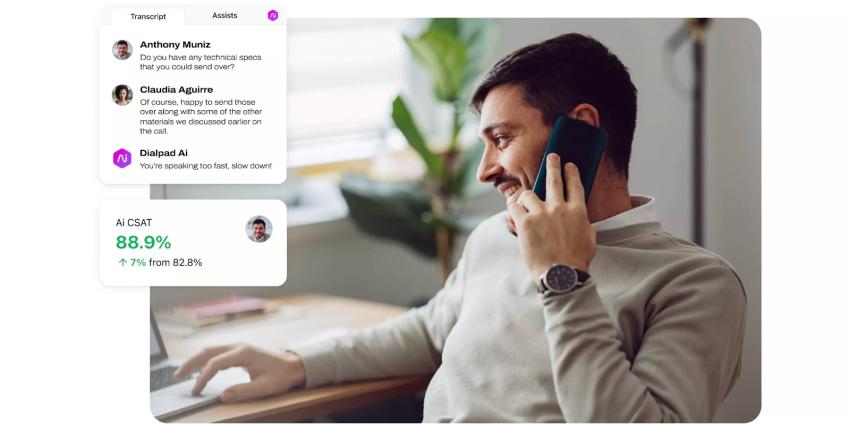
Dialpad’s AI receptionist is built into its cloud communication stack. It answers calls, sends them to the right team, and learns from user behavior over time, all configured without code. Administrators can adjust AI agent workflows directly in the dashboard anytime. Dialpad also offers custom pricing options for businesses with unique needs or high call volumes.
Features:
- Combines voice, messaging, and video in one centralized platform
- Transcribes calls and analyzes sentiment in real time
- Summarizes calls with follow-up actions automatically
- Handles missed calls, routes callers based on intent, and books appointments
Ideal for:
Dialpad is best suited for fast-paced teams in midsize businesses or enterprises with high call volumes. Its AI receptionist learns from every interaction, improving call handling over time. Sales teams can use Dialpad’s AI Playbooks to stay on message.
Meanwhile, support agents, sellers, supervisors, and other roles involved in contact center AI benefit from real-time AI CSAT insights to quickly assess customer satisfaction.
Pricing: AI receptionist comes free with all business phone plans starting at $15 per user per month. However, Ai CSAT and Ai Playbooks require a premium subscription ($170 per user per month).
3. RingCentral
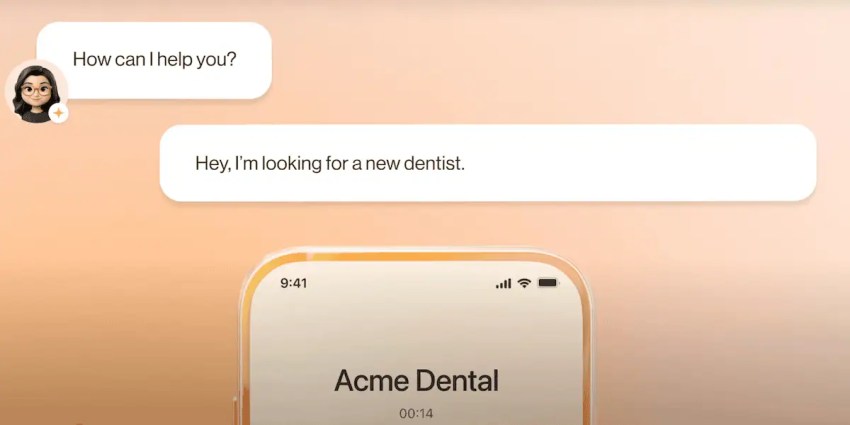
RingCentral’s AI receptionist is an AI phone agent baked into its new RingEX suite for an added cost. For teams already invested in RingCentral’s ecosystem, the tool is a natural extension that adds efficiency and security without complexity. The AI receptionist answers calls, captures leads, and maintains professionalism even when the business owner is unavailable.
Features:
- Routes calls based on department, location, or caller identity
- Offers voice customization with multiple personas (skills) and languages
- Manages appointments and sends SMS reminders
- Filters spam and answers after-hours inquiries automatically
- Uses a dashboard for routing rules and call flows
Ideal for:
This platform is a good fit for large teams or global businesses that need a flexible phone system. It’s equally advisable for industries with strict rules, such as finance, health care, and legal services. RingCentral’s AI offers call automation without losing control.
Pricing: RingCentral’s AI Receptionist is integrated into its RingEX suite but is also offered as an add-on, starting at $59/month for 100 minutes.
Which AI receptionist provider is right for you?
- Choose Nextiva if: You want a simple, all-in-one AI receptionist and top-rated phone service to manage all your business communications and customer interactions.
- Choose Dialpad if: Your focus is on sales or support team performance and you need real-time AI insights and coaching.
- Choose RingCentral if: You’re a large or global organization that needs advanced security, compliance, and complex call routing capabilities.
Who Uses an AI Receptionist? Common Use Cases
Different industries use (or can use) AI receptionists in their own ways, but the goal is the same: to save time, handle calls faster, and not miss any opportunity.
AI receptionists are equipped to efficiently address customer concerns across industries, resolving issues, scheduling appointments, and providing information to enhance customer satisfaction. By 2026, AI receptionists will recognize returning customers and recall their past interactions, further enhancing the customer experience and delivering consistent service that builds brand reliability.
Healthcare clinics and medical practices
Common use cases for an AI receptionist include scheduling appointments, sending reminders to reduce no-shows, and answering questions about opening hours, insurance, or directions in healthcare settings. AI receptionists gather essential patient information, such as appointment times and insurance details, to streamline scheduling and support.
AI phone agents filter routine calls and route urgent calls directly to the on-call nurse or doctor. This keeps hospital reception desks clear, and patients receive prompt care.
Law firms and legal services
In law firms, an AI receptionist can filter new callers, ask preliminary questions, schedule consultations, and connect clients with the right attorney or paralegal. It can answer calls around the clock, helping firms generate new leads and avoid missing client opportunities.
Home services (plumbing, electricians, HVAC)
AI receptionists can book service appointments, explain prices, and handle after-hours emergencies. Say a customer reports a burst pipe or a broken air conditioner, AI can record the details and immediately notify the on-call technician. This way, home services can secure more business, and customers receive assistance faster.
AI receptionists also help home service businesses turn missed calls into repeat customers by ensuring every inquiry is addressed promptly.
Real estate agencies
Real estate firms can use an AI receptionist to capture leads from property listings or advertisements, schedule viewings, answer questions about listings, and connect existing clients with their agent. Automation helps reduce phone calls and gives real estate firms more time to close deals. It also promptly answers new inquiries, so agents don’t miss potential buyers or tenants.
How To Choose the Best AI Receptionist for Your Business
The best AI receptionist isn’t the one with the most features, but the one tailored to your business. Here’s how to find the right AI virtual assistant:
Understand your business needs
Understand how your business phone system currently performs. How many calls do you receive daily? What do customers typically call for? Are they appointments, questions, emergencies, or sales inquiries?
Track your call volume for at least a week and note the most common call reasons. Use this data to set your budget. A good AI receptionist will adapt to your needs rather than forcing you to adapt to them.
Assess the AI’s conversational capabilities
The best way to evaluate an AI receptionist is to see it in action. Request a demo or trial version and test it in real-world scenarios. See how it responds to natural language, different accents, and follow-up questions. It should respond clearly and guide callers without causing confusion or frustration.
Consider integration options
An AI receptionist should integrate with your existing tools, such as a CRM, calendar, or scheduling software. Make a list of your essential tools and request a complete integration list from the provider before signing up. A well-integrated system saves time and eliminates the need for manual updates.
Check for security and compliance
If your company handles sensitive information, security isn’t an option. Healthcare, finance, and other regulated industries require providers that adhere to strict compliance rules. Request proof of compliance certifications (such as HIPAA or PCI DSS) from the provider and inquire about how they store and protect customer data.
Compare pricing models
Providers charge differently. Some charge per call or minute, others offer a monthly flat rate. Estimate your monthly call volume and compare it with the pricing models of at least three AI receptionist providers to find the best value. Choose a plan that matches your call volume and expected growth so you don’t pay for features you’ll never use.
Read our detailed guide comparing the costs of live answering services. We’ve done the work for you so you can make sure the investment is worth it.

Drawbacks and Considerations With AI Receptionists
AI receptionists are extremely useful, but not a complete replacement for humans. Let’s look at the most common disadvantages you’ll come across:
The need for a human touch
While AI can handle routine calls, it can’t replace humans in every situation. Callers expect empathy and clear judgment when dealing with complex or emotional issues. Businesses should use a mix of automation and live agents to handle both simple and sensitive issues.
Setup and training time
An AI receptionist isn’t ready to use right away. It requires your business data, call flows, and answers to frequently asked questions. Setting it up takes time initially, but it pays off later with more precise answers.
Risk of misinterpretation
Even with the advances of agentic AI, despite its excellent performance, it can make mistakes. It can misunderstand, miss context, or provide incomplete answers. Regular performance checks and system updates help identify these issues early and ensure a smooth experience.
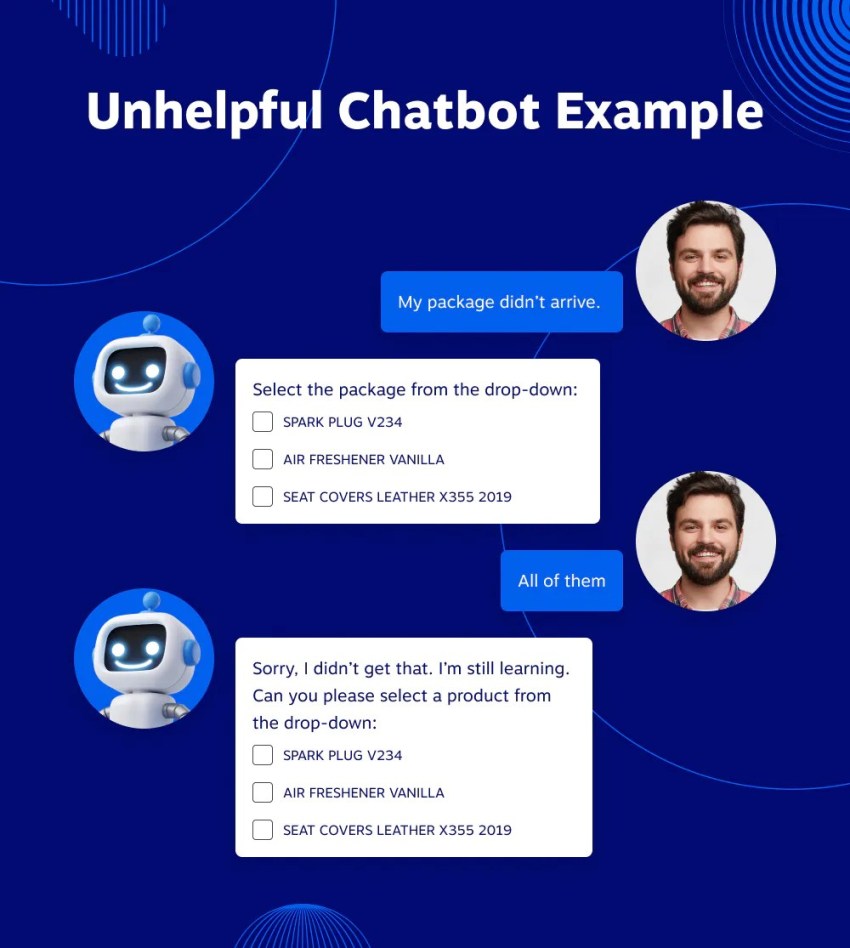
When you might not need an AI receptionist
AI receptionists are especially useful if phone calls are central to your business. They prevent lost calls, book appointments, prevent you from missing new leads, and relieve your staff of repetitive tasks.
You’re most likely to benefit if:
- Calls go unanswered after business hours
- Employees spend too much time scheduling appointments or repeating questions
- Call volume is growing faster than your team can handle
But not every business needs it right away.
You may not see much benefit if:
- You only receive a few calls per day
- A small team can handle calls without delay
- You aren’t busy with other tasks or projects
In these cases, voicemail transcription or call forwarding may be sufficient initially. As call volume increases or customers expect faster responses, switching to an AI receptionist becomes worthwhile.
Why Nextiva Leads the Pack
Selecting an AI receptionist goes beyond the immediate solutions it can provide. It’s about finding a system that will grow with your small business or midsize enterprise. The right solution should be easy to use, flexible, and designed for long-term value.
When you need a simple yet effective AI receptionist, XBert AI is the best choice for business owners to pick. Hear the demos for yourself.
Nextiva delivers calls, messages, automation, and customer insights all in one platform. It’s a future-ready system that’s not only simple to set up. As a UJET alternative, it also simplifies your workflow and leverages AI for improved customer experience as your business needs evolve.
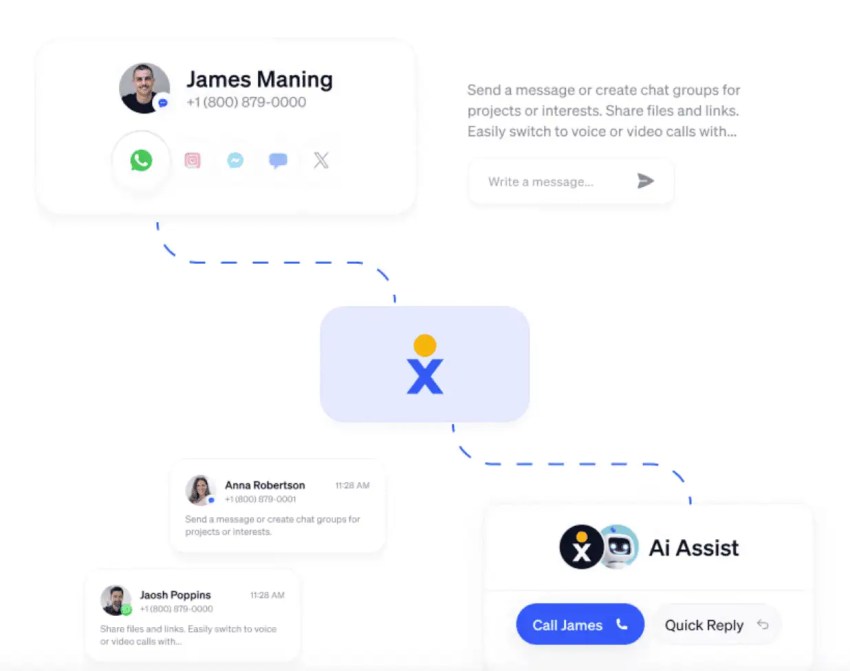
Discover how Nextiva’s solutions can streamline communication and enhance every call.
Run your business instead of answering calls all day
Nextiva’s AI-powered receptionist is perfect for handling calls so you can focus on what matters most.
Frequently Asked Questions (FAQs)
A traditional IVR (interactive voice response) uses a rigid phone tree (“Press 1 for sales, press 2 for support”). An AI receptionist uses NLP to understand natural language, enabling callers to easily express their needs in their own words.
The best AI receptionist depends on your inbound calling needs, but Nextiva’s XBert AI remains the highest-rated and offers extensive capabilities suitable for most businesses. Choose one that can manage your call volume, schedule appointments, and sync with your calendar or CRM. For small teams, options like Nextiva, with its easy setup and flexible pricing, are generally the best choice.
Some phone system providers offer limited free plans or trials. While these are useful for testing, they limit the range of features. For tools like call forwarding, after-hours customer support, or CRM integration, you’ll likely need a paid plan.
Yes. All leading AI receptionist platforms are designed to offer escalation calls and route them to the appropriate person or department based on the caller’s request or predefined rules.
Pricing varies by provider. Some charge a flat monthly fee per user, while others may use a per-call or per-minute model. Basic plans can start as low as $50 per month, but often have restrictions and limited features. However, Nextiva’s AI receptionist costs $99 for 100 conversations (over 30 seconds), and it offers many integrations.
Yes, if phone calls are important to you for sales, scheduling, or customer service. An AI receptionist helps reduce missed calls, book more appointments, and free up your team for other tasks. For businesses with a consistent call volume, the investment pays for itself quickly. Use this free AI receptionist ROI calculator to see how much value it can provide your business.
AI can take over routine reception tasks, such as answering customer calls, scheduling appointments, and forwarding messages. However, it can’t completely replace a real human. Many callers still want to speak to someone when they have complex issues, sensitive questions, or need personalized attention.
For small businesses, a hybrid approach is the best solution: AI handles everyday calls, while a human receptionist focuses on more important interactions and tasks that require judgment and empathy.


















 Customer Experience
Customer Experience 








